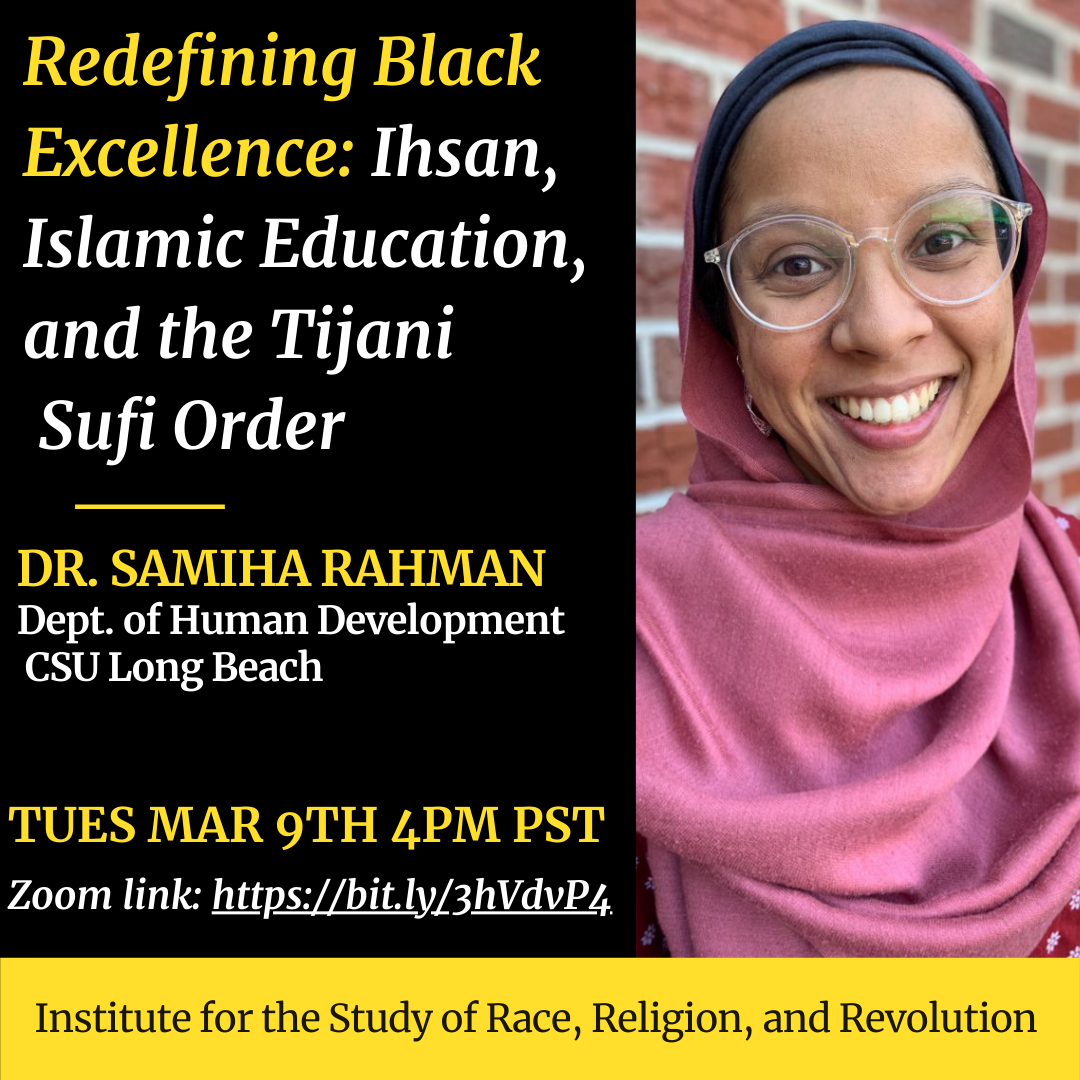
- This event has passed.
ISRRAR Event–Dr. Samiha Rahman, “Redefining Black Excellence: Ihsan, Islamic Education, and the Tijani Sufi Order”
March 9, 2021 @ 4:00 pm - 6:00 pm

Since the 1980s, hundreds of predominantly working-class African American Muslim youth have migrated to the West African Tijani Sufi town of Medina Baye, Senegal. They hope to circumvent the antiblackness, Islamophobia, and economic inequality they face in the U.S. in search of a transformative educational encounter in a society where Blackness and Islam constitute the dominant norms. This talk chronicles these young people’s everyday experiences pursuing Islamic education in Medina Baye. Complicating popular notions that link Black excellence to individualistic material gain and Black capitalism, Dr. Samiha Rahman (CSU Long Beach) argues that Black Muslim excellence (ihsan) provides an alternative paradigm rooted in the pursuit of human excellence through spiritual and social practice. Grounded in a transatlantic Black Muslim tradition, Black Muslim ihsan offers African American Muslims pathways to individual and collective liberation.
Join this Zoom event here: bit.ly/3hVdvP4
This event is part of the ISRRAR Winter Quarter series.
Professor Butch Ware and the ISRRAR announce the Winter Quarter schedule for HIST 210RA: Race, Faith, Revolution. Graduate students are invited to register for this 2-unit seminar and to sign up for the listserv at http://tinyurl.com/ISRRARListServ.
How have Black metaphysics articulated with racial politics in order to advance efforts of justice, liberation, and self-actualization? In this very special year of 2021, our seminar will take on manifestations of anti-black racism and imperialism, as well as African and African Diasporic efforts to mediate between the seen and unseen worlds in struggles for justice.
This graduate seminar is part of a broader collaborative process meant to engage graduate students and faculty alike. The Initiative for the Study of Race, Religion, and Revolution (ISRRAR) seeks to foster a conversation on intersections of spirituality and social change wherein works on (and by) formerly colonized peoples are central, rather than peripheral.
This approach is driven by an axial critique of the ways in which modernity’s core contradictions shape our shared pasts and presents. An era of revolutionary enlightenment, we are told, brought humanity out of the ‘dark ages.’ Freedom dawned. But this ‘age of lights’ brought the darkest of racial taxonomies, and scales of slavery and human suffering unknown to ancient and medieval worlds. Reason proclaimed its mission: liberate humanity from the bondage of irrational religion. Yet rational political economies brought global empires, world wars, and ethnic genocides. Moreover, new nationalisms have drawn on older religious repertories to define citizens and subject them to moral authority. Self-congratulatory Western tropes, however, tend to overlook the ubiquity of race and the persistence of faith, portraying them as incidental rather than fundamental.
Colonized peoples in Africa and the Americas, tell different tales. A generation of emergent scholarship has brought these forward. Scholars (many trained in interdisciplinary fields) have recovered ‘native’ narratives and ontologies of the oppressed, often dislodging dominant meta-narratives in the study of the global West. In History 210 we engage live presentations of the works of scholars, activists, and artists whose conceptualization and execution of their research breaks new ground in these domains.
